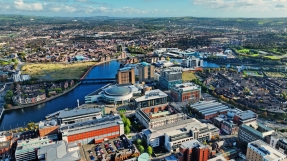
You may have thought Britain was in trouble because of facts such as political deadlock over Brexit or the decline in church attendance.
But I am afraid the situation is much, much worse than that. Just when we thought we had heard all the bad tidings we could cope with, we must now come to terms with the news that the title of the 'nation's favourite hymn' has been won by.... Jerusalem!
Yes, that's right – the one with the stirring tune (by Sir Hubert Parry, a great composer who should have known better) but the terrible words by William Blake, beginning 'And did those feet in ancient times...'. This latest confirmation of our national decline comes thanks to the BBC's Songs of Praise, which conducted a poll of viewers.
I mean, really – where does one start with this? Well, obviously, with the words. And therein lies the problem: 'And did those feet in ancient time, walk upon England's mountains green:' The answer to that, politely, is 'no', of course; Jesus did not visit England. He did not walk upon mountains green, trackways muddy, pavements cracked or roads potholed.
Line two continues: 'And was the holy Lamb of God, On England's pleasant pastures seen!' Again, we answer with a resounding 'No!' There is no record of Christ being seen physically on England's pleasant pastures, muddy meadows, littered lay-bys or has-been high streets.
We also, at this point, lodge a muted protest about Blake's poor punctuation, noting that he fails to end either his first or second questions with a question mark – instead opting for a colon then an exclamation mark... We frown, mark a bold 'x' in red biro in the margin and write sternly: 'Try harder, William!'
But Blake has not finished: 'And did the Countenance Divine, Shine forth upon our clouded hills?' At least he has now discovered how to end an interrogative sentence correctly, but still, I am afraid, the answer is 'NO!' 'And was Jerusalem builded here,' Blake persists, 'Among these dark Satanic Mills?' to which we shout, 'No, no, and a thousand times no!' and mutter something about how irritating 'builded' is – a word one dictionary describes as 'archaic or childish'.
Let's be honest: it's nonsense, really, isn't it? No-one is even sure what the line 'dark Satanic Mills' is referring to. Many have taken it to refer to the oppressive working conditions of 19th century Britain. Others, however, including former Bishop of Durham Tom Wright, offer an alternative explanation, saying that the hymn's 'mills' were 'not... as some imagine, the cotton-mills and steel-mills of the new, noisy and smoky industrial revolution. They were the great churches, like Westminster Abbey and St Paul's Cathedral, which Blake saw as being hopelessly in thrall to the follies of the world'. That's an interesting theory, but no-one is sure either way.
Then we get on to all the stuff about 'bows of burning gold' and 'arrows of desire'. As one 'hip' student online guide to the poem puts it rather archly: 'This is really cool and all, but what damage is the speaker going to do with arrows made out of... desire? What does that even mean anyway?'
Good question...
By now, if you are astute – which I am sure you are – you may have gathered that really this is not my favourite hymn. But please don't take this somewhat tongue-in-cheek rant too seriously – there are, after all, more important things to get worked up about. And at least you've been spared a column of hand-wringing about Ely Cathedral's commemoration of a supermarket cat which was another option. So count your blessings...
But gentle mockery of Jerusalem's words aside, let this be said in truth: if England needs Jesus, it needs the real Jesus. It needs not the Jesus of legend, the poetic Jesus, the Jesus co-opted for a spurious soft nationalism sung to a rousing organ tune. It needs the Jesus of the gospels: wise, loving and gracious – but also unsettling, challenging, table-upending.
After all, as Tom Wright, commenting on the hymn, again puts it: 'Even if Jesus had come as a boy to these islands... why would he have wanted to reconstruct Jerusalem? When we read the gospels, most of the times Jesus refers to Jerusalem it is to warn that a city which behaves like that is courting disaster.' Indeed.
In these days of political trench warfare, environmental danger, contempt for human life and blasé indifference to the things of eternity, that's the Jesus we need. And after all, that is, at the end of the day, the only Jesus there is.
David Baker is a former daily newspaper journalist now working as an Anglican minister in Sussex, England. Find him on Twitter @Baker_David_A













